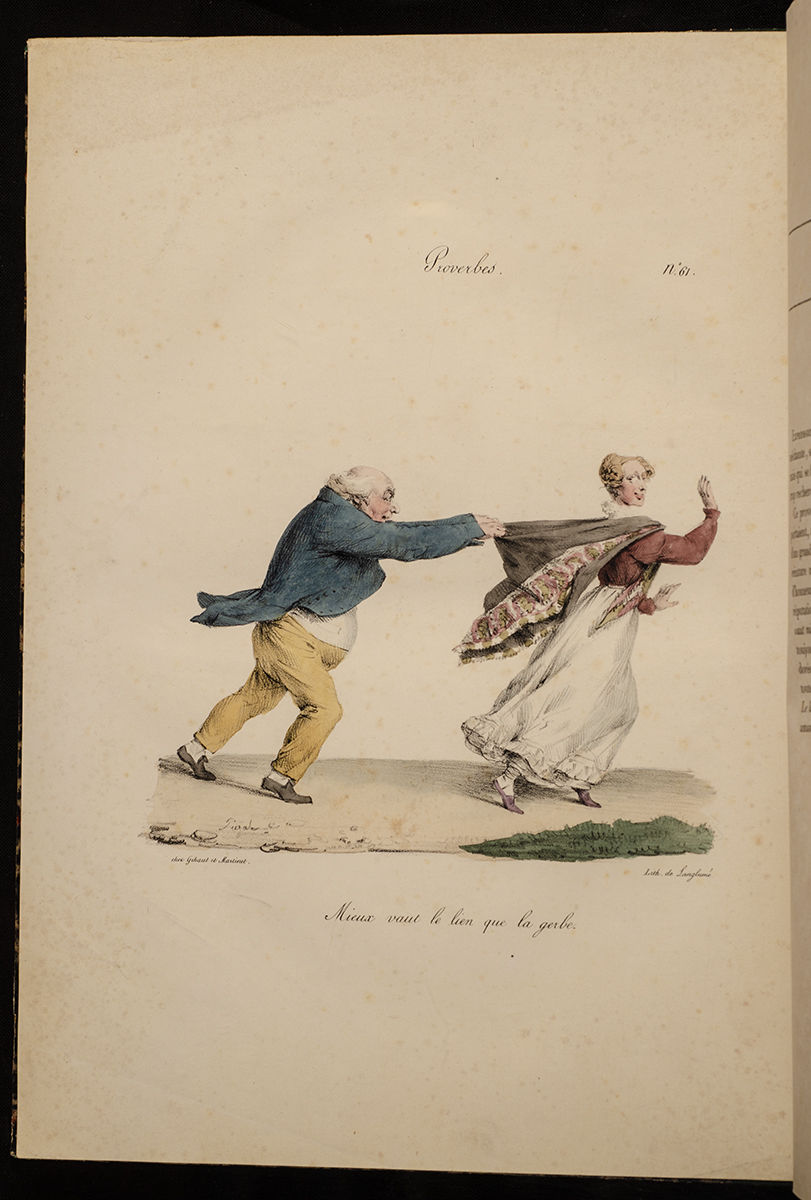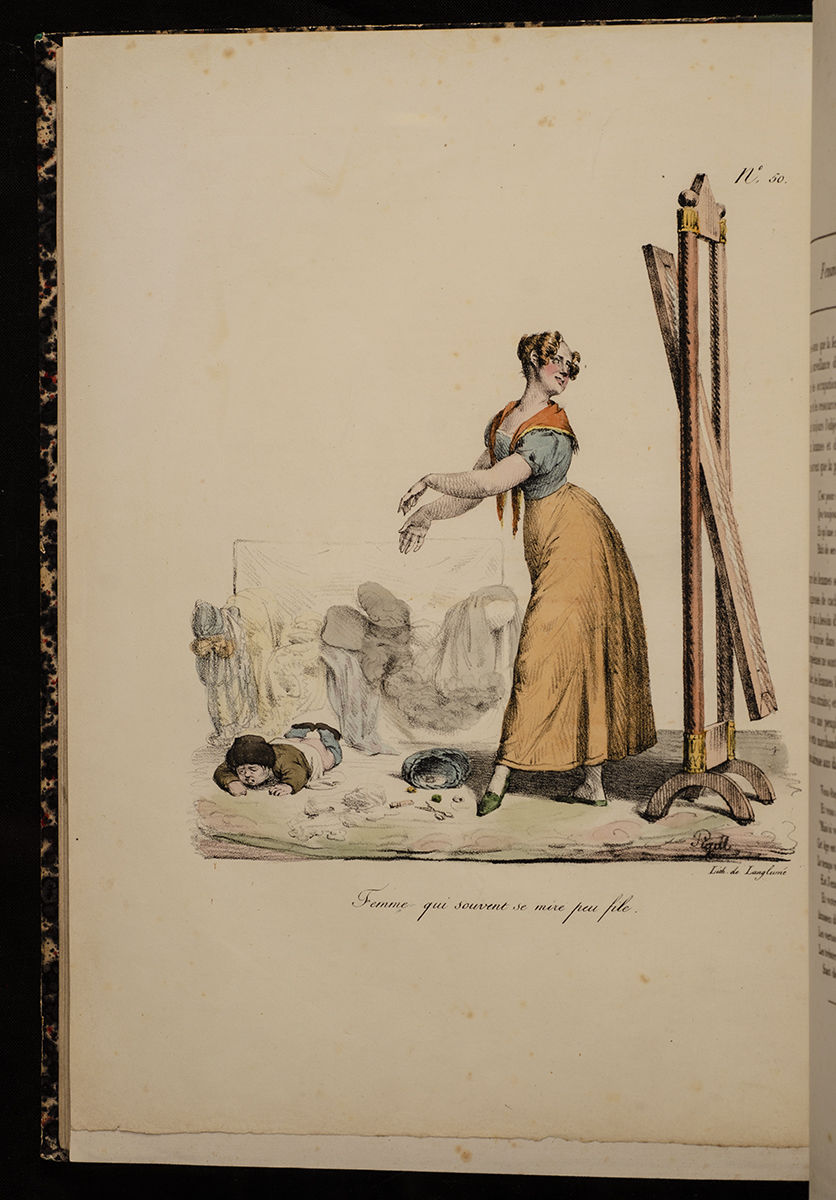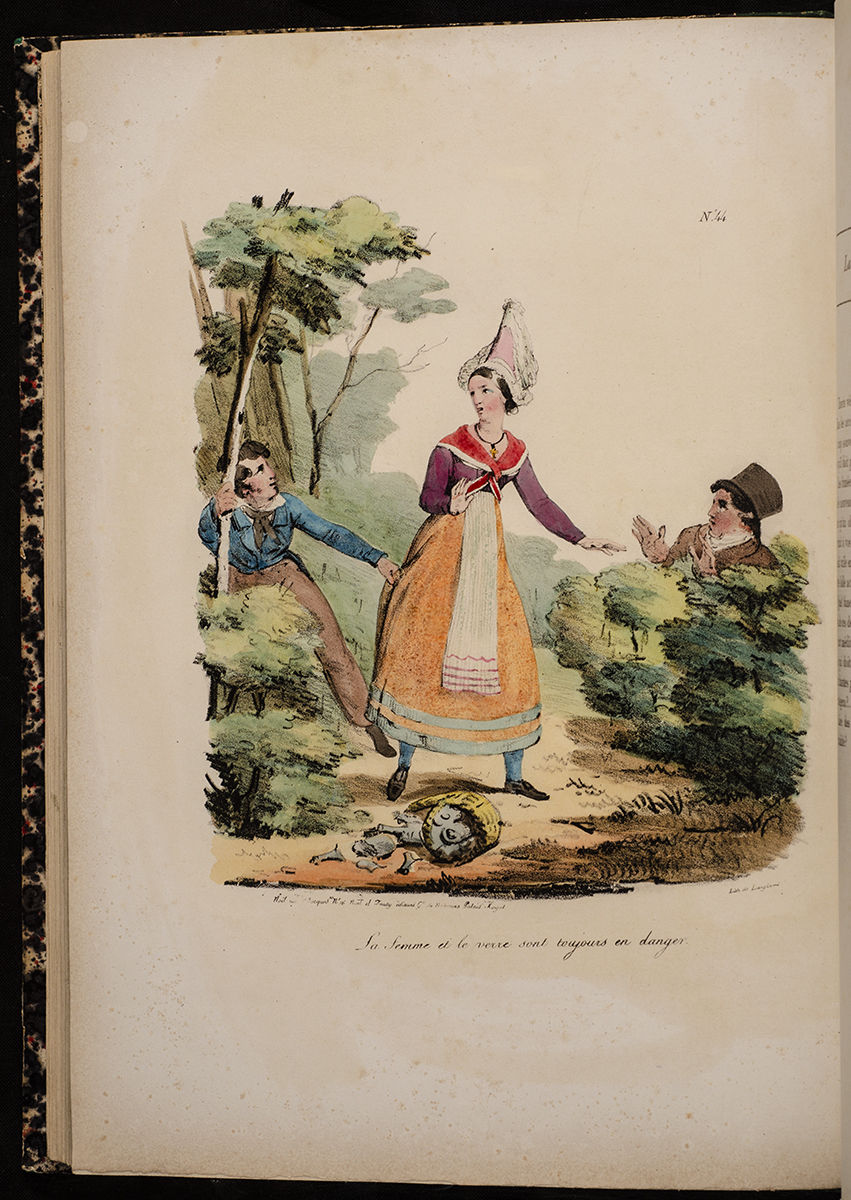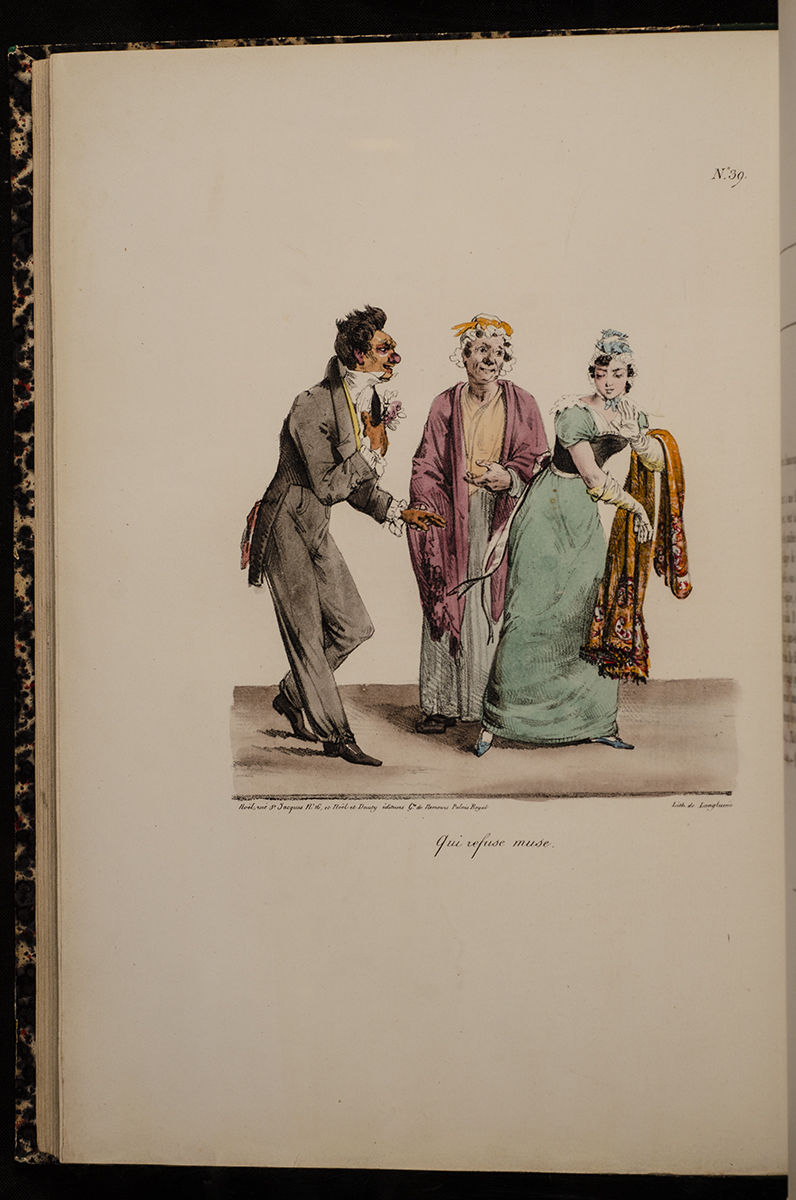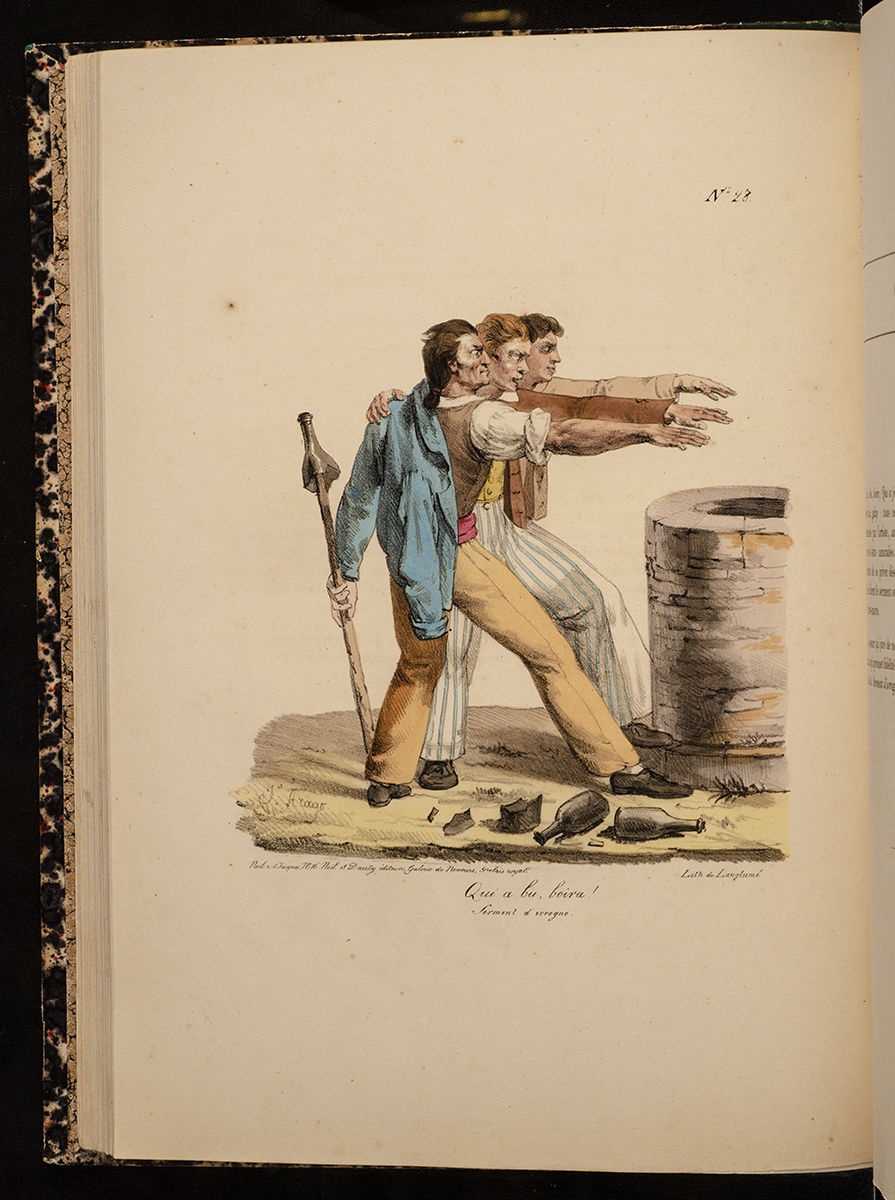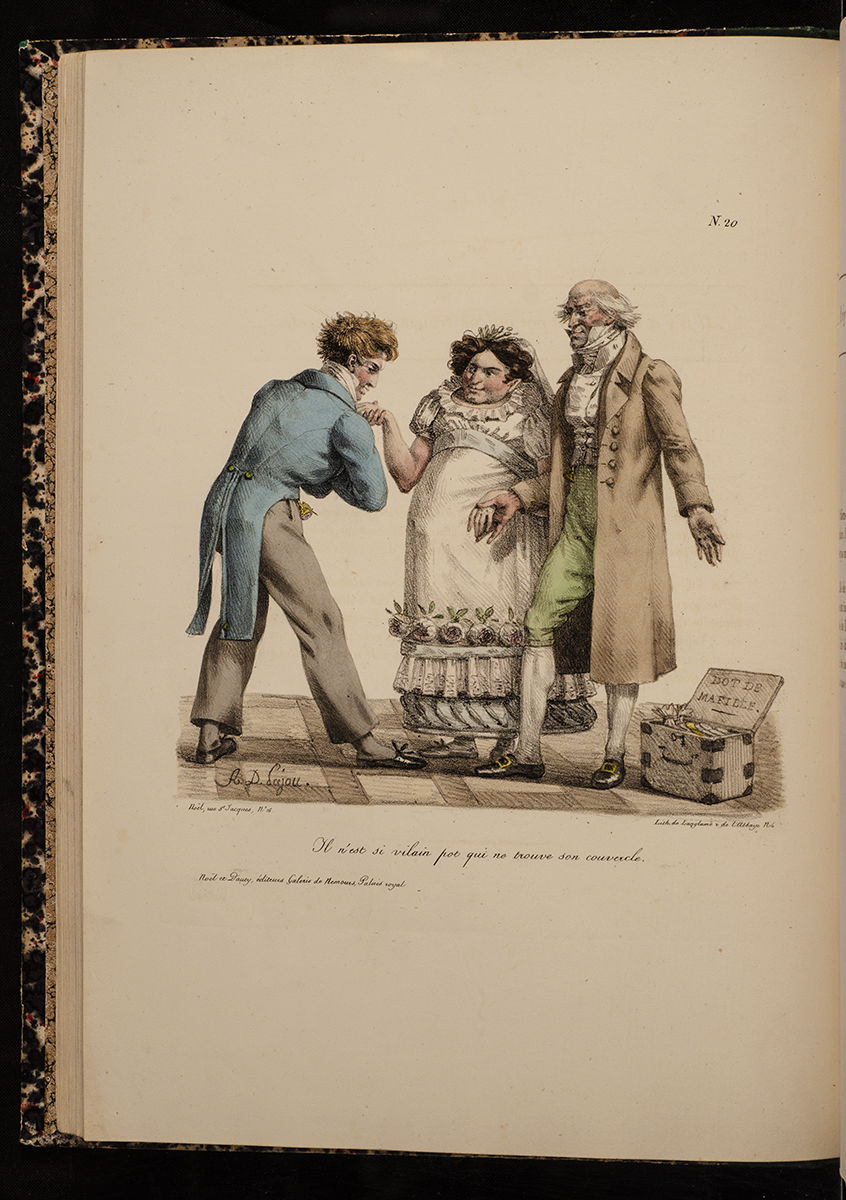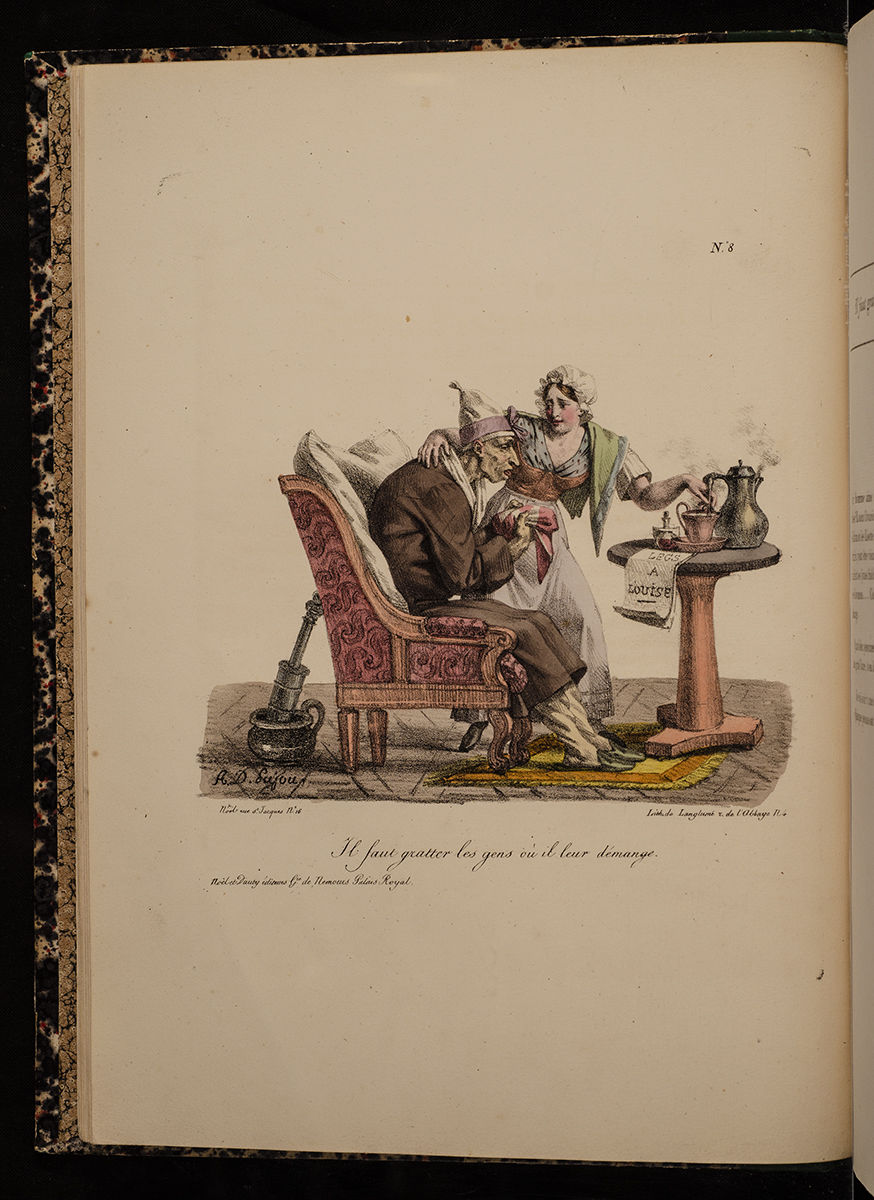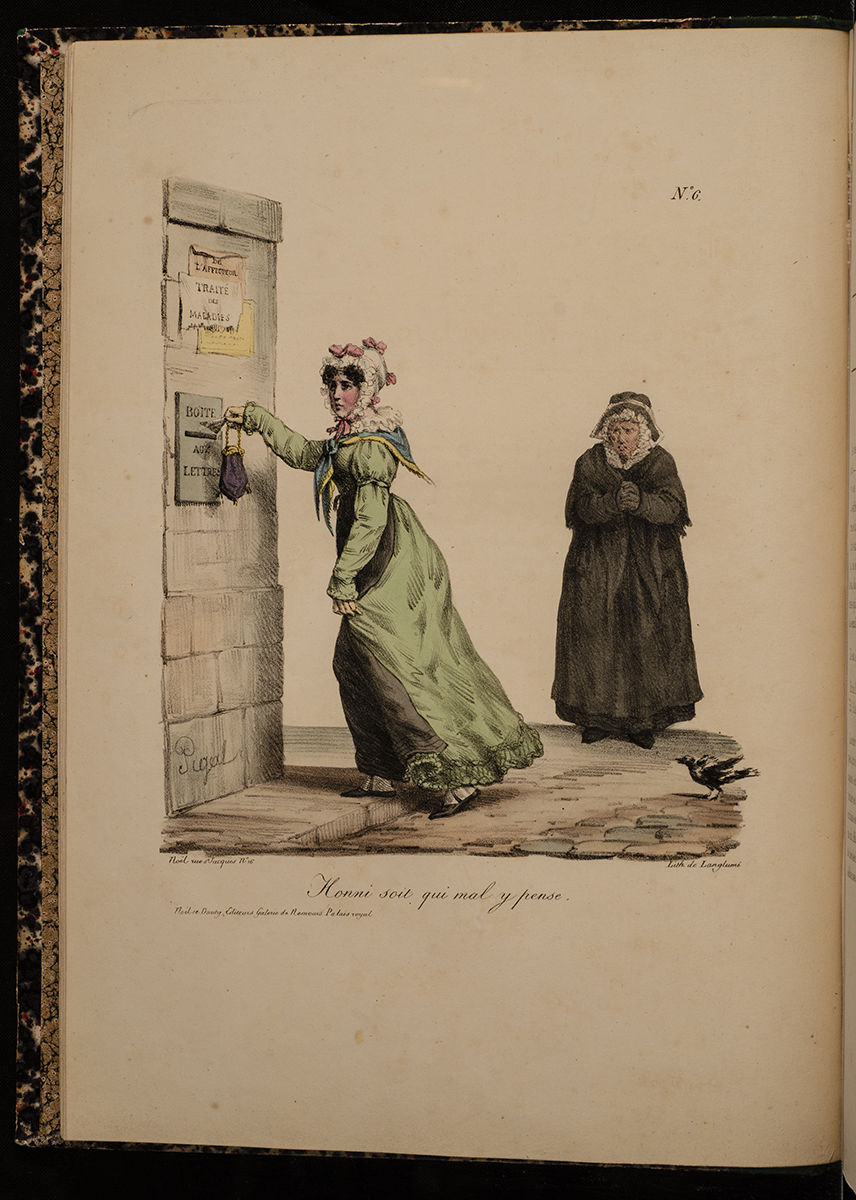Proverbes et Bons Mots Mis en Action, d'après les Moeurs Populaires;
PIGAL, Edmé-Jean; ARAGO, Joseph Honoré; PAJOU, Augustin
- Publisher: Paris: Chez Noel et Dauty, 1823
Paris: Chez Noel et Dauty, 1823. Proverbs and Good Words Put Into Action…
Complete With Sixty-Six Fine Hand Colored Lithographs
PIGAL, Edme-Jean (1798-1873). ARAGO, Jacques (1790-1855). PAJOU, Augustin (1800-1878). Proverbes et Bons Mots Mis en Action, d'après les Moeurs Populaires; Composés et Lithographiés par MM. Pigal, Pajou et J.s Arago, avec Texte explicatif rédigé par J.s Arago… Paris: Chez Noel et Dauty, 1823.
First and only edition. Large folio (14 x 10 1/4 inches; 355 x 260 mm.). Sixty-six fine hand colored plates lithographed by Langlumé, each with a printed leaf of explanation by Jacques Arago.
Bound ca. 1840 in quarter green calf over mottled boards, smooth spine ruled and lettered in gilt, marbled end-papers. Some intermittent foxing to a few plates. A fine example complete with the text leaves. Excessively rare with just three copies located in libraries and institutions worldwide.
This exceptionally rare and beautiful book of sixty-six hand colored caricatures depicting French proverbs is complete as issued. It was published in fascicules (parts), each with six hand colored plates and apparently was intended to run to twelve fascicules, but it was discontinued after the eleventh part. The amusing proverbs include "Un peu d'aide fait grand bien." (A little help does a lot of good…); "Honni soit qui mal y pense." (Evil be to him that thinks evil…); "L'occasion sait le larron." (Opportunity makes the thief…); "Battons le ser tandis qu'il est chaud." (Strike while the iron is hot…); "Ventre assamé n' a pas d'oreilles." (A hungry stomach has no ears…); "Pierre qui roule n'amasse pas mousse." (A rolling stone gathers no moss…); "Tout ce qui reluit n'est pas or." (All that glitters is not gold…); "Tôt ou tard la vérité se découvre." (Sooner or later the truth is discovered…); "Il vaut mieux tard que jamais." (It is better late than never…); and "Mari sourd et Femme aveugle sont toujours bon ménage." (A deaf husband and a blind wife are always a happy couple…).
"Pigal produced an album illustrating proverbs which is not listed in standard reference books. Precedent for this subject had been set by Breugel in the sixteenth century, but Goya's Disparates were not published until 1964. The French proverbs represented in the exhibition are by and large close to similar sayings in English, and the pictures are self-explanatory."(Beatrice Farwell. The Charged Image, French Lithographic Caricature 1816-1848, pp.132-135 and full-page color illustration La nuit, tous chats sont gris on p. 34).
"Like the caricatures in La Charge, Arago's prints were both thematically and stylistically similar to the caricatures published in Philipon's newspapers. This is hardly surprising since Arago, like his brothers Étienne [who was the owner of the Théâtre du Vaudeville and the foremost republican militant in the theatrical world] and Francois, was a committed republican and one of Philipon's friends. He had in fact contributed to La Caricature in 1833; it is hardly surprising that he used Philipon's arsenal of anti-Louis-Philippe imagery in his work for the legitimists…" (David S. Kerr. Caricature and French Political Culture 1830-1848, pp. 176-177).
We can locate just three copies in Libraries and Institutions worldwide:
1. (BNF) Bibliotheque Nationale de France,
2. Universitätsbibliothek Erlangen-Nürnberg, Hauptbibliothek,
3. (BVB) Bibliotheksverbund Bayern
Hiler, p. 377; Lipperheide, 3677; Not in Bobins, Colas or Ray.
The plates:
1. Un peu d'aide fait grand bien. A little help does a lot of good… (Pigal)
2. Nécessité n' a pas de lois. Necessity has no law… (Pajou)
3. A l'impossible nul n'est tenu. No one is bound to do impossibilities… (Arago)
4. Celui qui s'attend à l'écuelle d'autrui a souvent mal dîné. He who expects from another man's bowl often dines poorly… (Pajou)
5. Bien embarrassé qui tient la queue de la poële. He has enough to do who hold the handle of the frying-pan… (Arago)
6. Honni soit qui mal y pense. Evil be to him that thinks evil… (Pigal)
7. La Moitié du monde se moque de l'autre. One half of the world laughs at the other half… (Pajou)
8. Il faut gratter les gens par où il leur démange. Scratch people where they itch… (Pajou)
9. Qui se ressemble s'assemble. Birds of a feather flock together… (Pigal)
10. Il ne faut jeter le manche après la cognée. One should not throw in the towel… (Pajou)
11. Le deux sont la paire. The perfect pair… (Pigal)
12. Sandis! Si je le tenais!… Sandis! If I had him… (Pajou)
13. A beau mentir qui vient de loin. He who comes from afar may lie boldly… (Arago)
14. A bon vin point d'enseigne. Good wine needs no sign… (Pigal)
15. 99 Moutons et un Champenois sont 100 bétes. 99 sheep and one shepherd are 100 beasts… (Arago)
16. Selon les gens l'encens. Like saint like incense… (Pajou)
17. Tel maître tel valet. Like master, like man… (Pigal)
18. L'occasion sait le larron. Opportunity makes the thief… (Arago)
19. Battons le ser tandis qu'il est chaud. Strike while the iron is hot… (unsigned)
20. Il, n'y a si méchant pot qui ne trouve son couvercle. There is no pot so bad that it doesn't have a lid… (Pajou)
21. La propreté est une demi-vertu. Cleanliness is half a virtue… (Arago)
22. Chacun son métier. Let everyone mind his own business… (unsigned)
23. On prend son bien où on le trouve. A man takes his own wherever he finds it… (Pajou)
24. Les hommes se prennent par la douceur. The men have their soft spots… (Arago)
25. Petit-à-petit l'oiseau sait son nid. Little by little the birds builds its nest… (Arago)
26. On ne court pas deux lièvres à-la-fois. One cannot have two hares at the same time… (Arago)
27. Ventre assamé n' a pas d'oreilles. A hungry stomach has no ears… (Arago)
28. Qui a bu, boira. He who has drunk will drink… (Arago)
29. Tel qui rit vendredi, dimanche pleurera. He that laughs on Friday may cry on Sunday… (Arago)
30. Qui trop embrasse mal étreint. He who grasps too much does not hold firmly… (Arago)
31. Pierre qui roule n'amasse pas mousse. A rolling stone gathers no moss… (Pigal)
32. Qui aime bien, châtie bien. Who loves well chastises well… (Arago)
33. On ne saurait tirer de l'huile d'un mur. You cannot get oil out of a wall… (Pajou)
34. Tout ce qui reluit n'est pas or. All that glitters is not gold… (Arago)
35. Où la chèvre est attachée il faut qu'elle broute. Where the goat is tied is where she must graze… (Pajou)
36. La nuit, tous chats sont gris. All cats are gray in the dark… (Pigal)
37. La raison de plus fort est toujours la meilleure. The argument of the strongest have always the most weight…(Pigal)
38. L'eau éloignée n' éteint pas le feu qui brûle. Removing the water does not extinguish the burning fire… (Pajou)
39. Qui refuse, muse. Who refuses, muses… (Arago)
40. Deux chiens ne sont jamais d'accord pour un seul os. Two dogs will never share a single bone… (Pigal)
41. A défaut de pain les gâteaux sont bons. If one can't have bread then cake is good… (Arago)
42. Au dernier les os. For the last-comer, the bones… (Pigal)
43. Il n'y aurait pas de grands, s'il n'y avait pas de petits. There would be no greats if there were no children… (Arago)
44. La femme et le verre sont toujours en danger. The woman and the glass are still in danger… (unsigned)
45. Vie sans amis, mort sans témoins. Live without friends, die without witnesses… (unsigned)
46. Tôt ou tard la vérité se découvre. Sooner or later the truth is discovered… (Arago)
47. Rien n'est beau que le vrai, le vrai seul est aimable. Nothing is as beautiful as the real, the real one is kind… (Arago)
48. Il vaut mieux tard que jamais. It is better late than never… (Pigal)
49. Il faut avoir des amis partout. You have to have friends everywhere… (Pigal)
50. Femme qui souvent se mire peu sile. Women who often find disapproval… (Pigal)
51. Péril passé, promesses oubliées. Danger past, promises forgotten… (Pigal)
52. A fripon, fripon et demi. To a rogue, a rogue and a half… (Pigal)
53. Un clou chasse l'autre. One nail drives out another… (Pigal)
54. A d'autres, dénicheur de merles. The others scout blackbirds… (Pigal)
55. Aujourd' hui ami, demain ennemi. Today friend, tomorrow enemy… (Pigal)
56. Les petits Présens entretiennent l' amitié. Little presents maintain friendship… (Pigal)
57. Il ne faut pas s'en rapporter à l'Etiquette du sac. Don't rely on the label of the bag… (Pigal)
58. Point d'argent, point de Suisse. No money no Swiss… (Pigal)
59. L'appétit vient en mangeant. The appetite comes with eating… (Pigal)
60. Les bons comptes sont les bons amis. Good accounts make good friends… (Pigal)
61. Mieux vaut le lien que la gerbe. Better link the wreath… (Pigal)
62. L'Oeil du Maître. The Eye of the Master… (Pigal)
63. Dis-moi qui tu hantes, je te dirai qui tu es. Tell me the company you keep, and I will tell you who you are… (Pigal)
64. Il n'est voisin qui ne voisine. There is no nearby neighbor… (Pigal)
65. Qui trop se hâte, en beau chemin se fourvoie. He that is in too much haste, may stumble on a good road… (Pigal)
66. Mari sourd et Femme aveugle sont toujours bon ménage. A deaf husband and a blind wife are always a happy couple… (Pigal).
Share This Item:
Offered by David Brass Rare Books, Inc.
David Brass Rare Books, Inc.
PO Box 9029
Calabasas
CA 91372
Email: info@davidbrassrarebooks.com
Phone: ++1 818 222 4103
Website: www.davidbrassrarebooks.com
Store Hours
By appointment only.

David Brass Rare Books, Inc. specializes in buying and selling only the finest examples of English, American and European Literature, Children\\\'s Books, Color-Plate Books, Illustrated Books, Early Printed Books, Private Press Books, Fine Bindings, Original Artwork, Manuscripts, High Spot Modern First Editions, Rare Books and High Spots.
Terms of Sale for David Brass Rare Books, Inc.
We will extend to you a 48-hour approval period on all items that are purchased sight unseen. If you are not completely satisfied with the item simply contact us within 48 hours after receipt, and then return it in the same condition you received it for a full refund, less freight charges, or any related costs including credit card transactions, taxes, and duties levied, especially when returning from other countries.






